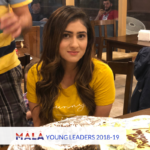Farhana Shafi is a member of the 2018-19 MALA Young Leaders Fellowship. Fellows participate in monthly digital seminars, dinner discussions, and other MALA events. As part of the program, Fellows reflect on their multiple layers of identities – as daughters, sons, professionals, athletes, and so much more – and share those reflections into the MALA story collection. Personal stories can be a powerful catalyst for change – challenging stereotypes, building bridges, and inspiring action. In a country as diverse and complex as the United States, the identities of Muslim Americans remain layered and contested. We all have stories to tell: stories that deserve to be collected, conserved, and celebrated. We are honored to share the stories of our Fellows here.
It was the second week of school of my 7th grade year, Tuesday morning in Mathematics class, and I was just getting to know my new teacher and classmates.
All of the sudden we heard a loud boom.
I initially thought there was a big car accident or an electric pole busted, but the reality of what happened that day forever changed my life. I remember hiding under the desks, and eventually we all went to the gymnasium to be picked up by our parents. When our parents came pick us up, a million things ran through my head – but I never could have imagined the real reason.
My middle school was less than two miles away from the Pentagon, and the day I am referring to was September 11, 2001, the day that the World Trade Centers and the Pentagon got attacked by terrorists. Before this day, I didn’t even know what a terrorist was. When I got home, my dad was glued to the TV and I kept seeing the same footage of the planes crashing into the buildings. I honestly still wasn’t able to comprehend what happened. Wasn’t it the pilots? Wasn’t it just an accident they crashed their planes?
When I found out the truth, I wasn’t able to make sense of it. At the age of 11, this was something new to me; maybe our generation wasn’t educated enough prior to this happening. We didn’t have school the next day, and when we finally went back to school, I saw the stares not only from classmates but also some faculty members. Why were they looking at me funny? I heard comments from people that made my stomach curl: they were blaming me as if I had anything to do with this. I went through racist remarks, hard stares, and instances of injustices from that day forward, and this made me want to not associate with any of my religious or cultural background. It was easier than having to constantly explain that the actions of those terrorists had nothing to do with my culture or religion.
In a sense, I was ignoring the challenges I rather than facing them, but at 11 I did what I felt safe doing. I didn’t even look Middle Eastern – most people assumed I was Chinese or from Latin America, so I used this as a safety shield so that I could be as far away from culture and religion. This shaped me into an insecure person and held me back from pursuing my goals, because no matter how competent I was, if they knew my background I felt they wouldn’t accept me. I felt like a hypocrite because I loved my culture and loved my family, so why did I act completely different when they weren’t around?
It took me years to get to where I am now, and it involved a lot of self-doubt, self-blame, and mostly self-hate. Self-hate because I felt I was too weak to stand up for my family and myself when we were victims of discrimination. I look back now and realized how hard I was on myself: at the end of the day, I was a child and in a sense after September 11, 2001, I stopped growing.
I wasn’t able to move forward with my life until I accepted that I am just as important as everyone else and that no one has the right to make me feel like I am not because as an American, I suffered too, just like everyone else.
I suffered in two ways: on one hand, my country just got attacked, and the other hand I suffered because after that day I was attacked verbally and emotionally.
I didn’t have the same chance as everyone to grieve for the tragedy that had befallen on my country because I was too busy explaining that I had nothing to do with it. This wasn’t fair because I should have been crying for my fellow Americans and not for myself.
But looking back at how things were and where I am now, I learned in order for others to accept us, we need to accept ourselves first. When I learned this, life became easier. I wasn’t afraid to tell people about my background and was actually excited to tell people. The reason I am proud to be a part of MALA is because I want to contribute to everyone being heard. Everyone has a story that has impacted them and shaped them into who they are today, and I want to help record history by making sure every story is heard.


